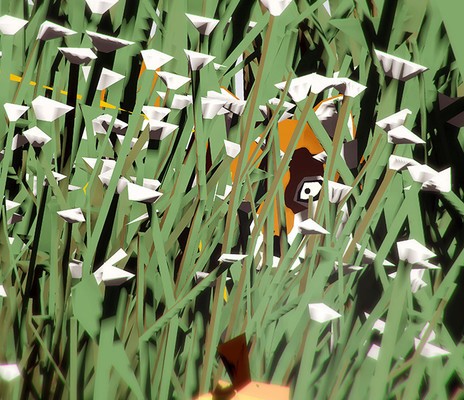Ian Cheng
Forking at Perfection
20 Feb - 16 May 2016

Ian Cheng, Emissary Forks at Perfection, 2015, live simulation and story, infinite duration. Courtesy Gallery Pilar Corrias, Standard (Oslo), and the artist
IAN CHENG
Forking at Perfection
20 February - 16 May 2016
The work of the American artist Ian Cheng (b. 1984) explores the nature of mutation and the capacity of humans to relate to change. Drawing on principles of video game design, improvisation, and Darwinian brutality, Cheng has developed so-called “live simulations,” living virtual ecosystems that begin with basic programmed properties, but are left to self-evolve without authorial control or end. His simulations model the dynamics of often imaginative organisms and ecologies, but do so with the unforgiving causality found in nature itself. What results is a cascade of emergent behaviors that the artist can manage but never truly master. This process is punctuated by states of chaos, collapse, cannibalization, recombination, perfection, luck and boredom. Cheng, who studied cognitive science at the University of California, Berkeley, describes his simulations as akin to a “neurological gym”: a format for viewers to deliberately exercise the feelings of confusion, anxiety, and cognitive dissonance that accompany the experience of unrelenting change. In his first solo exhibition in Switzerland, Cheng presents two versions of the simulation Emissary Forks At Perfection: as a panoramic projection originally shown in 2015; and as its mutation, or «fork», in the form of a tablet-based experience that invites viewers to physically explore the world of the simulation, its organisms, and its ongoing dynamics.
Forking at Perfection
20 February - 16 May 2016
The work of the American artist Ian Cheng (b. 1984) explores the nature of mutation and the capacity of humans to relate to change. Drawing on principles of video game design, improvisation, and Darwinian brutality, Cheng has developed so-called “live simulations,” living virtual ecosystems that begin with basic programmed properties, but are left to self-evolve without authorial control or end. His simulations model the dynamics of often imaginative organisms and ecologies, but do so with the unforgiving causality found in nature itself. What results is a cascade of emergent behaviors that the artist can manage but never truly master. This process is punctuated by states of chaos, collapse, cannibalization, recombination, perfection, luck and boredom. Cheng, who studied cognitive science at the University of California, Berkeley, describes his simulations as akin to a “neurological gym”: a format for viewers to deliberately exercise the feelings of confusion, anxiety, and cognitive dissonance that accompany the experience of unrelenting change. In his first solo exhibition in Switzerland, Cheng presents two versions of the simulation Emissary Forks At Perfection: as a panoramic projection originally shown in 2015; and as its mutation, or «fork», in the form of a tablet-based experience that invites viewers to physically explore the world of the simulation, its organisms, and its ongoing dynamics.
